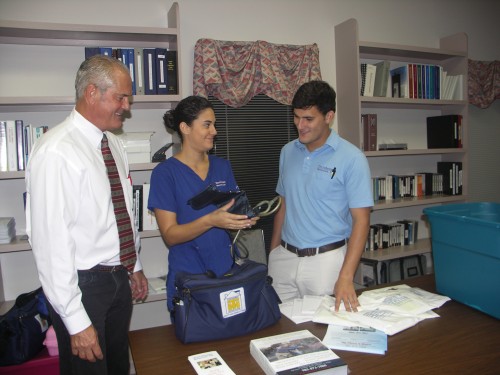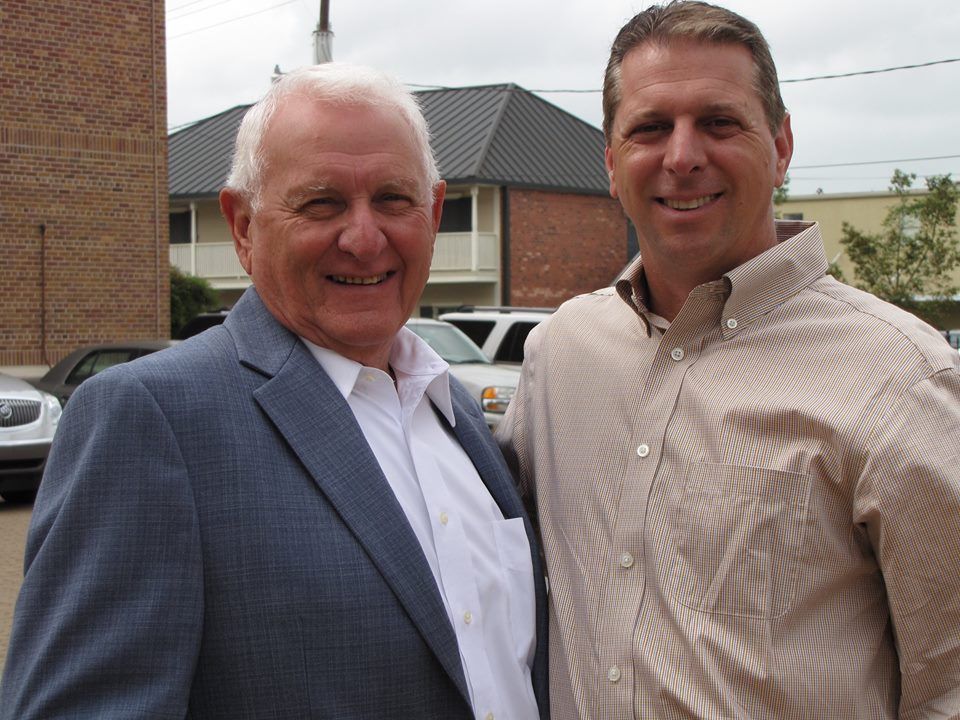
Fletcher’s new campus lauded for business model
August 7, 2012
Super mom: Lyons juggling multiple challenges
August 15, 2012Drastic changes are taking place in traditional medical services, but according to Ronald Eschete, home health care will emerge as the preferred norm.
When Eschete was laid off during an oil industry downturn in the early 1990s, the business professional and his registered nurse wife, Tammy, were faced with considering their options.
A friend suggested pooling their skills. That led to the creation of Terrebonne Homecare. Almost two decades later, this business has established itself as a predominate part of the Tri-parish medical community.
The Eschete family includes daughter Erin Hebert, also a registered nurse, son Braden Eschete, who is a junior at Nicholls State University majoring in health care management, and 34 additional medical professionals.
According to Ronald, home health care not only provides a cost-effective alternative to lengthy hospital stays, it offers patients of any age or varying degrees of illnesses and ailments the comforts of being at home.
“As far as the overall system, home health care is the cheapest way of taking care of a patient,” Ronald said. “You don’t have the overhead costs of a hospital or nursing home.”
Hospitals provide an important service, he said, but people enjoy being in the comfort of familiar surroundings and tend to respond better to treatments in home environments.
With federal and state credentials, Terrebonne Homecare’s registered nurses, licensed practical nurses and certified nursing assistants serve Terrebonne, Lafourche and St. Mary parishes.
Working in concert with their patient’s doctors, Terrebonne Homecare is approved by Medicare and provides a wide range of services from simple wound maintenance to skilled nursing. Traditional insurance providers also recognize and work with home care agencies.
Speech, physical and occupational therapy services are offered by social workers through Terrebonne Homecare as an added feature.
With approximately 200 regular clients, Ronald said one of the misconceptions of home health care is that it is reserved for the elderly. Instead, he noted, with hospitals sending patients home soon after surgery, home care provides an opportunity for patients that might not be fully prepared to watch after themselves.
“[Today] you can do more and more in the home,” Ronald said. “You can give IVs, perform wound care, really it covers everything.”
For Braden, dealing with government changes to health care has been the greatest challenge. “A lot of what we do and the decisions we make are reflective of what is going on [in the medical field],” he said. “It’s stuff we can’t control.”
Charges for home health care are set by insurance companies and Medicare. “Our rates are set by the federal government, just like hospitals and doctors,” Ronald said.
For the elder Eschete, collecting money from insurance companies and federal agencies is his biggest challenge and impacts how business is operated. “At the same time, you have to maximize care to the patients and make sure you are giving good service.”
With current national health care concerns, the Eschetes contend that every medical organization is being cut and forced to find ways to be more efficient, based on watching overhead expenses, supplies, reducing waste, centralizing operations and maximizing placement of nurses to keep them visiting homes more than being on the road.
“While insurance companies are raising their rates they are actually decreasing what they pay providers,” Ronald said. “You have to balance that every day.”
Ronald said he and his son, as a management team, make every effort to not worry about what they cannot control. “We deal with what we have some control over,” he said. “I just try to project what we think is going to happen and ask, ‘How can we address that and stay in business?’”
The Eschetes confirmed that home health care carries a ring of the days when doctors made house calls. Ronald said with businesses like Terrebonne Homecare, doctors making rounds to residential locations might not be far away from making a return.
“There are no more frills in medical care,” Ronald said. “You’ve got to be conscious about what you are spending and giving to the patient.”
Many health care professionals have voiced concern that preventive medicine might be threatened with cuts in hospital services, leaving crisis care as the main alternative.
Home health care, according to the Eschetes, picks up the slack. “You have a nurse that can catch a problem early and save money down the road,” Ronald said.
Home health care goes beyond treating an illness or changing a bandage. Ronald said it means looking around a home to note ways it can be modified for the client’s benefit. “[We] can go into your home and see how you are living, and help you with your overall situation and, hopefully, make it a safer and healthier situation,” he said. “It can save the system a lot of money down the road.”
“Having home health care is a choice individuals can make for themselves,” Braden said. “That decision is big because people are getting hit hard with new [medical] rules. So if you have a company following the rules you are protected because we are going to protect you.”
“When selecting a home care provider, think ahead and be prepared,” Ronald added. “It is like when you choose a doctor. You do your homework. Talk to your friends. Home health is the same. The government leaves the right of choosing an agency to the individual. If you are not happy with an agency, you can change. Don’t be satisfied with poor care. Demand good care.”
Health care is making rapid changes as hospitals stabilize patients, address immediate conditions and send people home. The one certainty for the Eschetes is their conviction that home health care will survive when traditional institutions can no longer afford to function as they have in the past.
Terrebonne Homecare CEO Ronald Eschete observes as his daughter Erin Hebert and son Braden Eschete demonstrate proper equipment inventory for daily health care assignments. As the head of this family business, Eschete said home health has become a growing presence in medical practice.








